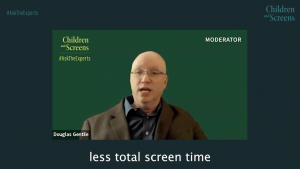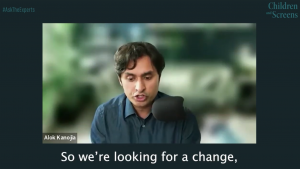
Douglas Gentile, PhD (Distinguished Professor in Liberal Arts and Sciences, Department of Psychology, Iowa State University), discusses research into behavioral, wellness, and school performance improvements seen in children whose parents set screen time and content limits in #AskTheExperts webinar “State of Play: The Ins and Outs of Healthy and Problematic Video Gaming” on March 20, 2024.
Read the Video Transcript
[Dr. Douglas Gentile] We had 1,400 families of third- through fifth-graders and we followed them across a school year. And we asked- we talked to the teachers, we talked to the school nurses, we talked to the children. We got a lot of data about these families. And if parents set limits on amount and content of screen media at the beginning of the school year, you saw some immediate effects that, yes, those kids were consuming less total screen time and they were also exposed to less violent media. When we followed these same children out to the end of the school year, those whose parents had set limits on amount and content at the beginning of the school year, they were getting better sleep, which in turn related to lower weight gains or lower risk for obesity. They were getting better grades in school. They were more prosocial in their behaviors as rated by teachers, which is kind of remarkable because the teachers don’t know what family rules for media are at home. But they can see the effects, you know, they can see the behaviors in the classroom. And they were less aggressive, again, as rated by teachers. Now, the two things that fascinate me about this are, first of all, those aren’t the same type of outcome variable. You’ve got physical health, school performance, and social wellness. Those three different types of outcome variables don’t usually co-occur. But this one simple thing of setting limits on amount and content of screen media influences all of them. So it is a protective factor that extends out wide, both in time and across a wide range of health and wellness indicators.
View the full webinar

State of Play: The Ins and Outs of Healthy and Problematic Video Gaming
Video gaming has become a near-universal activity with children. Which features in popular video games can promote (or hinder) their cognitive development and mental health?
Douglas Gentile, PhD
Distinguished Professor in Liberal Arts and Sciences, Department of Psychology, Iowa State University
Nick Ballou, PhD
Postdoctoral Researcher, Oxford Internet Institute
Adam Gazzaley, MD, PhD
Founder & Executive Director, Neuroscape; David Dolby Distinguished Professor of Neurology, Physiology and Psychiatry, University of California San Francisco
Kishonna Gray, PhD
Associate Professor, University of Kentucky
Alok Kanojia, MD, MPH
President & Co-Founder, Healthy Gamer





